Monthly Archives: September 2016
Auditors question spending at Louisiana fisheries agency
Here are some preliminary findings from the Louisiana Legislative Auditor’s office, which raises questions about spending in the state’s Department of Wildlife and Fisheries from 2010 through 2015. A draft of the audit report was obtained by The Associated Press and hasn’t been released publicly yet: Less than half the 2,376 fish samples expected to be tested in a seafood safety program financed by BP were collected. A biologist wasn’t always present for the sampling, auditors say, and the sampling operation was overseen by an employee who “did not have supervisory or biology education or experience.” Unnecessary boats, fishing equipment, cameras and computers were bought with the money, according to the draft report, which says the fish testing team spent $3 million on testing of 1,091 samples that couldn’t determine fish safety, the equivalent of $2,796 spent per tested fish. Federal grant funds were spent to buy a $220,000 used boat, motors and a trailer “that appeared to have little or no benefit to the agency,” has been used twice since 2012 and have cost nearly $38,000 to maintain and repair, another $764,000 in clothing and uniform purchases, sponsorship spending and contracts, Nearly $134,000 was paid, for example, to a university for the design and upkeep of a website that benefited two private entities that host annual fishing rodeos,,, Read the rest here 20:25
from 2010 through 2015. A draft of the audit report was obtained by The Associated Press and hasn’t been released publicly yet: Less than half the 2,376 fish samples expected to be tested in a seafood safety program financed by BP were collected. A biologist wasn’t always present for the sampling, auditors say, and the sampling operation was overseen by an employee who “did not have supervisory or biology education or experience.” Unnecessary boats, fishing equipment, cameras and computers were bought with the money, according to the draft report, which says the fish testing team spent $3 million on testing of 1,091 samples that couldn’t determine fish safety, the equivalent of $2,796 spent per tested fish. Federal grant funds were spent to buy a $220,000 used boat, motors and a trailer “that appeared to have little or no benefit to the agency,” has been used twice since 2012 and have cost nearly $38,000 to maintain and repair, another $764,000 in clothing and uniform purchases, sponsorship spending and contracts, Nearly $134,000 was paid, for example, to a university for the design and upkeep of a website that benefited two private entities that host annual fishing rodeos,,, Read the rest here 20:25
NEFMC Press Release: Council Approves 2017 US/Canada TACs; hears FW 56 progress
 NEFMC approves the 2017 total allowable catch for three groundfish stocks on Georges Bank. The agreement sets the shared TAC at 730 metric tons.The U.S. will be allowed to take 146 metric tons and Canada will get the rest. Read the rest here 17:31
NEFMC approves the 2017 total allowable catch for three groundfish stocks on Georges Bank. The agreement sets the shared TAC at 730 metric tons.The U.S. will be allowed to take 146 metric tons and Canada will get the rest. Read the rest here 17:31New Effort Underway To Study Black Sea Bass In Southern New England
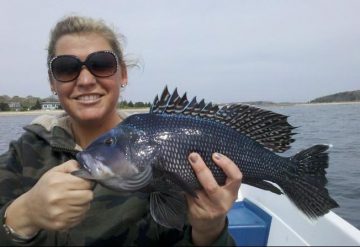 The Commercial Fisheries Research Foundation is kicking off a new project to collect data on black sea bass, a species that has moved north in search of cooler water. Catch limits for black sea bass in New England are a small compared to the Mid-Atlantic states, where the fish are typically found, according to Anna Malek Mercer, the foundation’s executive director. That means New England fishermen are throwing back very large quantities of black sea bass, she said. And it’s a highly valuable species. “So this will fetch at the dock between $4 and $7 a pound,” said Malek Mercer. “It’s super important in that way. Really could begin to fill some of this economic void caused by the downturns in things like ground fish and southern New England lobsters. ” The project will enlist Rhode Island fishermen to collect data on black sea bass. Read the story here 16:29
The Commercial Fisheries Research Foundation is kicking off a new project to collect data on black sea bass, a species that has moved north in search of cooler water. Catch limits for black sea bass in New England are a small compared to the Mid-Atlantic states, where the fish are typically found, according to Anna Malek Mercer, the foundation’s executive director. That means New England fishermen are throwing back very large quantities of black sea bass, she said. And it’s a highly valuable species. “So this will fetch at the dock between $4 and $7 a pound,” said Malek Mercer. “It’s super important in that way. Really could begin to fill some of this economic void caused by the downturns in things like ground fish and southern New England lobsters. ” The project will enlist Rhode Island fishermen to collect data on black sea bass. Read the story here 16:29
Lawsuit in the works over Southern Flounder
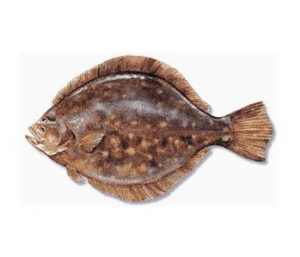 Carteret County will join fisheries groups in fighting the state Marine Fisheries Commission’s southern flounder supplement changes to reduce catch, which local fishermen say will kill the flounder industry here and cause a ripple effect in other local economic sectors. “I fished for a living, I know what the implications would’ve meant for my family if you’d have taken half of my income from the fall,” Commissioner Jonathan Robinson told the county board. “It means somebody’s not going to have Christmas. It means somebody’s going to have to decide whether to be cold this winter or have something to eat.” On his recommendation, county commissioners unanimously agreed to a resolution supporting a potential lawsuit from state and regional fishermen’s associations, primarily the N.C. Fisheries Association, against the MFC during their Monday meeting in the administration building. Consideration of the complaint follows the November 2015 adoption of a supplement to southern flounder management regulations, a process which critics say circumvented standard amendment procedures after stopgap reassurances in the form of stock assessments failed to pass peer review. “It didn’t pass the smell test. The science was flawed. It couldn’t pass independent peer review – the chief criteria for the development of any new regulations,” Mr. Robinson said. Read the rest here 14:19
Carteret County will join fisheries groups in fighting the state Marine Fisheries Commission’s southern flounder supplement changes to reduce catch, which local fishermen say will kill the flounder industry here and cause a ripple effect in other local economic sectors. “I fished for a living, I know what the implications would’ve meant for my family if you’d have taken half of my income from the fall,” Commissioner Jonathan Robinson told the county board. “It means somebody’s not going to have Christmas. It means somebody’s going to have to decide whether to be cold this winter or have something to eat.” On his recommendation, county commissioners unanimously agreed to a resolution supporting a potential lawsuit from state and regional fishermen’s associations, primarily the N.C. Fisheries Association, against the MFC during their Monday meeting in the administration building. Consideration of the complaint follows the November 2015 adoption of a supplement to southern flounder management regulations, a process which critics say circumvented standard amendment procedures after stopgap reassurances in the form of stock assessments failed to pass peer review. “It didn’t pass the smell test. The science was flawed. It couldn’t pass independent peer review – the chief criteria for the development of any new regulations,” Mr. Robinson said. Read the rest here 14:19
Athearn Marine Agency Boat of the Week: 79.8′ Steel Slime Eel/Lobster, 525HP, 8 Cylinder CAT, 2 gen sets
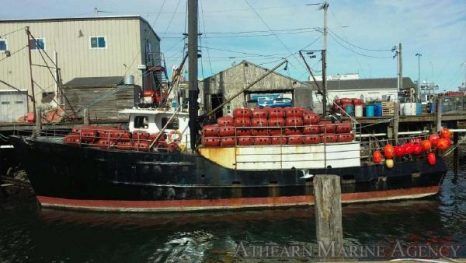 Specifications, information and 14 photo’s click here To see all the boats in this series, Click here 13:50
Specifications, information and 14 photo’s click here To see all the boats in this series, Click here 13:50
Appeal filed asking the court to overturn U.S. District Court Judge Joseph LaPlante’s July 29 at-sea monitor decision
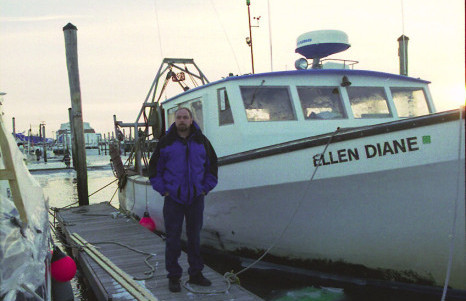 A fisherman is appealing a federal judge’s decision to allow the government to continue forcing fishermen to pay for at-sea monitors. Hampton fisherman, David Goethel, filed the appeal Sept. 6 and was joined by the Northeast Fishery Sector 13, which represents fishermen from Massachusetts to North Carolina. They are asking the court to overturn U.S. District Court Judge Joseph LaPlante’s July 29 decision that said the National Oceanic and Atmospheric Association was within its constitutional rights to force Northeast ground fishermen to pay for the monitors. Goethel and the fishery sector filed their original lawsuit last December, claiming it was unconstitutional for NOAA to require the industry to fund the monitors, which join fishermen on a percentage of fishing trips each year and cost approximately $700 per each of those days. Read the rest here 13:25
A fisherman is appealing a federal judge’s decision to allow the government to continue forcing fishermen to pay for at-sea monitors. Hampton fisherman, David Goethel, filed the appeal Sept. 6 and was joined by the Northeast Fishery Sector 13, which represents fishermen from Massachusetts to North Carolina. They are asking the court to overturn U.S. District Court Judge Joseph LaPlante’s July 29 decision that said the National Oceanic and Atmospheric Association was within its constitutional rights to force Northeast ground fishermen to pay for the monitors. Goethel and the fishery sector filed their original lawsuit last December, claiming it was unconstitutional for NOAA to require the industry to fund the monitors, which join fishermen on a percentage of fishing trips each year and cost approximately $700 per each of those days. Read the rest here 13:25
Hybridization – Escaped farmed salmon are breeding with wild salmon and producing offspring
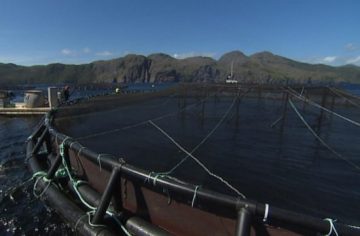 Research has confirmed that escaped farmed salmon are breeding with wild salmon and producing offspring in many rivers in Newfoundland. “We did find evidence of successful breeding between farmed and wild salmon. Approximately a third of the individuals we sampled showed evidence of hybrid ancestry,” said Department of Fisheries and Oceans scientist Ian Bradbury, of the unpublished study presented at an international aquaculture conference in St. John’s on Tuesday. Researchers studied thousands of fish in 18 rivers on the island’s south coast, and found evidence of interbreeding in 17 of them. “It was widespread across a suite of the rivers that we looked at. I think there was only one river where we didn’t see evidence of hybridization,” said Bradbury. It’s estimated that over the decades since the advent of aquaculture, more than 750,000 salmon have escaped from fish farms in the province. The new study sheds light on what happens to them in the wild. Read the story here 11:26
Research has confirmed that escaped farmed salmon are breeding with wild salmon and producing offspring in many rivers in Newfoundland. “We did find evidence of successful breeding between farmed and wild salmon. Approximately a third of the individuals we sampled showed evidence of hybrid ancestry,” said Department of Fisheries and Oceans scientist Ian Bradbury, of the unpublished study presented at an international aquaculture conference in St. John’s on Tuesday. Researchers studied thousands of fish in 18 rivers on the island’s south coast, and found evidence of interbreeding in 17 of them. “It was widespread across a suite of the rivers that we looked at. I think there was only one river where we didn’t see evidence of hybridization,” said Bradbury. It’s estimated that over the decades since the advent of aquaculture, more than 750,000 salmon have escaped from fish farms in the province. The new study sheds light on what happens to them in the wild. Read the story here 11:26
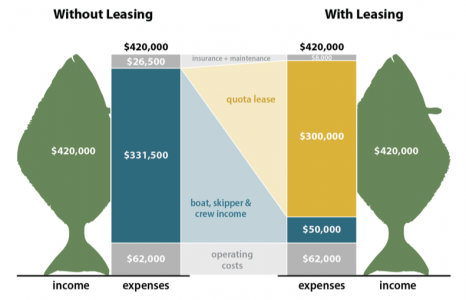
Owning the Owner Operator Policy
I read a blog post this week and the first paragraph rang so true to me: how most media stories would lead you to believe that the fishery is on its last legs and a dying industry when the opposite is in fact the case. What really caught my interest though was that there is a movement in the United States that if new fishing licences are issued, that they be to owner operators. At a time when Canada’s commitment to owner operator fisheries seems to be seriously in question, it’s interesting to see other countries advocating and moving in that direction. Owner operator fisheries means simply that the person who owns the boat and license is the one on the water fishing. While the official policy jargon in Canada will tell you that the Department of Fisheries and Oceans supports owner operator fisheries, the reality of policy decisions over the past two decades that I’ve been in the fishery have resulted in quite the opposite: management has moved towards individual transferable quotas (ITQ’s) which ultimately result in consolidation of access to the resource for a few (mainly) corporate interests who then hire people to fish. Read the story here. 10:16
The Shark Fin Ban That Should Be Banned – Shark Fin Trade Elimination Act of 2016
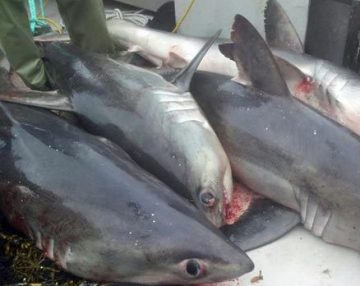 In the five seconds it takes to read this sentence, an estimated 16 sharks around the world have been killed. If you read on to the end of the article, that number will have risen to about 770. Every year, fishers haul up to 73 million sharks onto boats across the world’s oceans and trim their fins. In many cases, the rest of the body is thrown overboard to swim without propulsion. And without propulsion, no life-giving water flows over the sharks’ gills. They drown. This is shark finning, a cruel practice that feeds the demand for the Chinese delicacy of shark fin or fish wing soup. From boat to bowl, it is tasteless. To curb the death toll, the US Congress plans to introduce the Shark Fin Trade Elimination Act of 2016. If passed, to sell or possess shark fins would be a punishable offense. It’s the ultimate protection from being made into soup. Strange, then, that people who dedicate their lives to protecting sharks are vehemently opposed to the bill. In a letter to Senator Bill Nelson, Rob Hueter, director of the Center for Shark Research at the Mote Marine Laboratory in Sarasota, Florida, outlines his objections. At best, it’s unnecessary, he says. At worst, it harms rather than helps shark populations. Read the story here 09:46
In the five seconds it takes to read this sentence, an estimated 16 sharks around the world have been killed. If you read on to the end of the article, that number will have risen to about 770. Every year, fishers haul up to 73 million sharks onto boats across the world’s oceans and trim their fins. In many cases, the rest of the body is thrown overboard to swim without propulsion. And without propulsion, no life-giving water flows over the sharks’ gills. They drown. This is shark finning, a cruel practice that feeds the demand for the Chinese delicacy of shark fin or fish wing soup. From boat to bowl, it is tasteless. To curb the death toll, the US Congress plans to introduce the Shark Fin Trade Elimination Act of 2016. If passed, to sell or possess shark fins would be a punishable offense. It’s the ultimate protection from being made into soup. Strange, then, that people who dedicate their lives to protecting sharks are vehemently opposed to the bill. In a letter to Senator Bill Nelson, Rob Hueter, director of the Center for Shark Research at the Mote Marine Laboratory in Sarasota, Florida, outlines his objections. At best, it’s unnecessary, he says. At worst, it harms rather than helps shark populations. Read the story here 09:46
LIPA trustees won’t vote on wind farm project this week
 The state of New York has finalized a blue print for offshore wind energy, but the LIPA board won’t take up a measure to authorize the utility to move ahead with a contract this week. An agenda for the LIPA board meeting Wednesday in Uniondale doesn’t include the package of enhancements for the South Fork grid, which includes a 75-megawatt wind farm by Deepwater Wind and which LIPA was originally expected to vote on at its last meeting in July. Environmentalists who had been expecting finalization of the pact, which LIPA first disclosed to the press extensively in July, expressed disappointment Tuesday. But critics of offshore wind, particularly in the fishing industry, hailed the delay, and suggested the utility use it to do a more thorough review of the costs. “There’s no reason to do this wind farm when all they need to do is fix the grid on land,” said Bonnie Brady, executive director of the Long Island Commercial Fishing Association, which has opposed wind farm projects slated for fishing grounds. The group says pile-driving into the ocean floor, jet plowing the sea bottom and the impacts from the sea structures will harm fish and the sea bottom. “Destroying the ocean to save the world may not be the best solution,” Brady said. “Why not fix the problem?” Read the rest here 09:18
The state of New York has finalized a blue print for offshore wind energy, but the LIPA board won’t take up a measure to authorize the utility to move ahead with a contract this week. An agenda for the LIPA board meeting Wednesday in Uniondale doesn’t include the package of enhancements for the South Fork grid, which includes a 75-megawatt wind farm by Deepwater Wind and which LIPA was originally expected to vote on at its last meeting in July. Environmentalists who had been expecting finalization of the pact, which LIPA first disclosed to the press extensively in July, expressed disappointment Tuesday. But critics of offshore wind, particularly in the fishing industry, hailed the delay, and suggested the utility use it to do a more thorough review of the costs. “There’s no reason to do this wind farm when all they need to do is fix the grid on land,” said Bonnie Brady, executive director of the Long Island Commercial Fishing Association, which has opposed wind farm projects slated for fishing grounds. The group says pile-driving into the ocean floor, jet plowing the sea bottom and the impacts from the sea structures will harm fish and the sea bottom. “Destroying the ocean to save the world may not be the best solution,” Brady said. “Why not fix the problem?” Read the rest here 09:18
Grounded F/V Ms. Nicani returns to sea
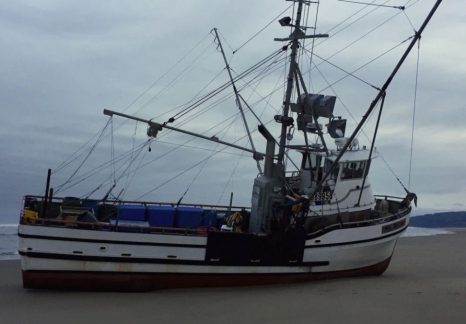 The sight of a large fishing boat grounded on the beach drew spectators to Heceta Beach near the Siuslaw River North Jetty over the weekend. The 50-foot commercial fishing vessel Ms. Nicani ran aground early Saturday morning at Heceta Beach between the North Jetty and Driftwood Shores Resort, while returning to Florence after tuna fishing. The vessel, owned by Florence resident Terry Duman, ran aground just after 2 a.m., Sept. 17. U.S. Coast Guard Sr. Chief Boatswains Mate Tim Tregoning said, “The Coast Guard assisted the crew in setting a stern anchor to make sure the boat would not be pushed farther up onto the beach. Read the story here 08:09
The sight of a large fishing boat grounded on the beach drew spectators to Heceta Beach near the Siuslaw River North Jetty over the weekend. The 50-foot commercial fishing vessel Ms. Nicani ran aground early Saturday morning at Heceta Beach between the North Jetty and Driftwood Shores Resort, while returning to Florence after tuna fishing. The vessel, owned by Florence resident Terry Duman, ran aground just after 2 a.m., Sept. 17. U.S. Coast Guard Sr. Chief Boatswains Mate Tim Tregoning said, “The Coast Guard assisted the crew in setting a stern anchor to make sure the boat would not be pushed farther up onto the beach. Read the story here 08:09
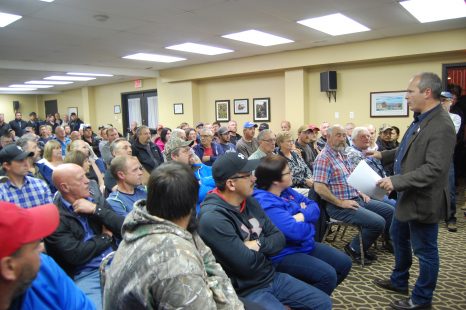
“I’m going to be part of this new union. I guarantee you that,” Hundreds attend FISHNL meeting in Clarenville
Those leading a fight to establish a new union exclusively for fish harvesters in Newfoundland and Labrador say the movement is receiving phenomenal support, and is poised to shake up the labour landscape in the province. Ryan Cleary says the response on social media and at a meeting in Corner Brook on Monday was “beyond our expectations,” and any doubt about whether there’s enough support to move forward has been erased. His words were supported by another large turnout on Tuesday at a meeting in Clarenville. Many harvesters said they travelled long distances from Burin and the Northern Peninsula to attend the meeting, and organizers like Cleary reiterated the movement is growing and that widespread discontent is real. “I have never experienced it before. It’s a phenomenon,” Cleary said Tuesday outside the Clarenville Inn. Speakers inside the meeting shared a myriad of frustrations with the FFAW and pledged to support efforts to form a new fishermen-only union. Read the story here – Hundreds attend FISHNL meeting in Clarenville There was hardly enough room to accommodate the hundreds of fish harvesters who came to the Clarenville Inn this afternoon to hear more about a proposed new fishermen’s union. Read the story here 20:01
Charlie Melancon’s Department Of Wrongdoing And Falsehood
 Have you been paying attention to the chaos at hand with the Louisiana Department of Wildlife and Fisheries? It appears that there is a full three-ring circus going on with DWF and its secretary, the former Democrat congressman Charlie Melancon. And after eight months on the job it’s pretty clear that perception among the in-the-know crowd was largely correct. The department is awash in controversy, if not criminality, and those affected by it are furious. To full explain this, we should go back several years to a program set up at the federal level. The Gulf of Mexico Fishery Management Council, which is a federal commission set up to govern offshore fishing in the five Gulf states (Florida, Alabama, Mississippi, Louisiana and Texas), and the National Marine Fisheries Service set up something called the Individual Fishing Quota system, or IFQ, to govern commercial fishing for red snapper. Meaning, the federal government resorted to crony capitalism as a means to govern Gulf red snapper fisheries. If you were a big player in the red snapper harvest before the program got started, you were one of the cronies and your incumbency would be protected. Read the story here. 19:20
Have you been paying attention to the chaos at hand with the Louisiana Department of Wildlife and Fisheries? It appears that there is a full three-ring circus going on with DWF and its secretary, the former Democrat congressman Charlie Melancon. And after eight months on the job it’s pretty clear that perception among the in-the-know crowd was largely correct. The department is awash in controversy, if not criminality, and those affected by it are furious. To full explain this, we should go back several years to a program set up at the federal level. The Gulf of Mexico Fishery Management Council, which is a federal commission set up to govern offshore fishing in the five Gulf states (Florida, Alabama, Mississippi, Louisiana and Texas), and the National Marine Fisheries Service set up something called the Individual Fishing Quota system, or IFQ, to govern commercial fishing for red snapper. Meaning, the federal government resorted to crony capitalism as a means to govern Gulf red snapper fisheries. If you were a big player in the red snapper harvest before the program got started, you were one of the cronies and your incumbency would be protected. Read the story here. 19:20
For Immediate Release – Hawaii Seafood Council: Hawaii Fishing Industry takes action to protect foreign crew from labor abuse
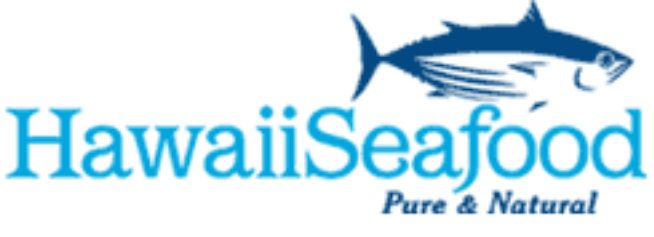 For Immediate Release Hawaii Seafood Council 1130 N Nimitz Hwy, Suite A263 Honolulu, Hawaii 96817 – Hawaii Longline Fishing Industry takes immediate action to assess and establish controls to protect foreign crew from forced labor and labor abuse. On September 8, 2016, an article was published by the Associated Press (AP) which included allegations of forced labor (slavery), human trafficking and poor working conditions on Hawaii longline fishing vessels that use foreign contracted crewmen. “The industry takes the AP report seriously, is actively assessing the situation and is committed to making certain that if found, forced labor and labor abuse is eliminated from the fishing industry” says Jim Cook, Hawaii fishing industry member and advocate. Read the press release, click here 17:46
For Immediate Release Hawaii Seafood Council 1130 N Nimitz Hwy, Suite A263 Honolulu, Hawaii 96817 – Hawaii Longline Fishing Industry takes immediate action to assess and establish controls to protect foreign crew from forced labor and labor abuse. On September 8, 2016, an article was published by the Associated Press (AP) which included allegations of forced labor (slavery), human trafficking and poor working conditions on Hawaii longline fishing vessels that use foreign contracted crewmen. “The industry takes the AP report seriously, is actively assessing the situation and is committed to making certain that if found, forced labor and labor abuse is eliminated from the fishing industry” says Jim Cook, Hawaii fishing industry member and advocate. Read the press release, click here 17:46
At one time, they were close collaborators. Great White Shark researchers spar over studies off Cape Cod
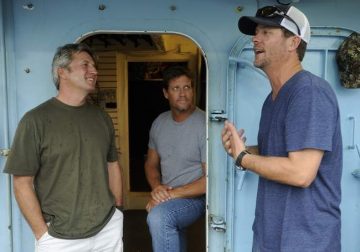 In 2012, OCEARCH operated under state Division of Marine Fisheries shark scientist Gregory Skomal’s federal permit to catch and tag great white sharks off Chatham. The next year, with Skomal again on board, the state allowed the big Alaskan crab boat the organization uses into state waters, less than 3 miles offshore. This June, citing concerns that any additional research on great white sharks within state waters could jeopardize a five-year population study led by Skomal, Division of Marine Fisheries Director David Pierce denied OCEARCH’s application for a research permit to catch great whites off Monomoy. “I’m concerned your proposed work would compromise our research by jeopardizing our study’s validity,” Pierce wrote to OCEARCH president Christopher Fischer in his June 30 letter denying the permit for state waters. In January, OCEARCH received a federal research permit from the National Oceanic and Atmospheric Administration’s highly migratory species program to capture and tag a total of 75 sharks of varying species, including eight great whites, anywhere from the Gulf of Mexico all the way up the Atlantic coast. Read the story here 14:16
In 2012, OCEARCH operated under state Division of Marine Fisheries shark scientist Gregory Skomal’s federal permit to catch and tag great white sharks off Chatham. The next year, with Skomal again on board, the state allowed the big Alaskan crab boat the organization uses into state waters, less than 3 miles offshore. This June, citing concerns that any additional research on great white sharks within state waters could jeopardize a five-year population study led by Skomal, Division of Marine Fisheries Director David Pierce denied OCEARCH’s application for a research permit to catch great whites off Monomoy. “I’m concerned your proposed work would compromise our research by jeopardizing our study’s validity,” Pierce wrote to OCEARCH president Christopher Fischer in his June 30 letter denying the permit for state waters. In January, OCEARCH received a federal research permit from the National Oceanic and Atmospheric Administration’s highly migratory species program to capture and tag a total of 75 sharks of varying species, including eight great whites, anywhere from the Gulf of Mexico all the way up the Atlantic coast. Read the story here 14:16
California sea otter population reaches record high number
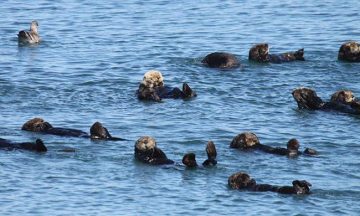 A growth in the amount of sea urchins, one of the otters’ favorite foods, seems to be the leading reason why otter numbers along the California coast have grown to 3,272 this year, up 11 percent since 2013, experts said as they released the latest survey. “The population is slowly but steadily recovering,” said Tim Tinker, a research biologist in Santa Cruz who leads the U.S. Geological Survey’s otter program. “And that’s good news because sea otters bring ecological benefits.”In fact, the otter population is likely at its highest level in at least 100 years, Tinker said. And for the first time, the otter numbers have exceeded 3,090, the total that the U.S. Fish and Wildlife Service says is needed to be met for three years in a row before they can be considered for removal from the endangered species list. Read the story here 13:45
A growth in the amount of sea urchins, one of the otters’ favorite foods, seems to be the leading reason why otter numbers along the California coast have grown to 3,272 this year, up 11 percent since 2013, experts said as they released the latest survey. “The population is slowly but steadily recovering,” said Tim Tinker, a research biologist in Santa Cruz who leads the U.S. Geological Survey’s otter program. “And that’s good news because sea otters bring ecological benefits.”In fact, the otter population is likely at its highest level in at least 100 years, Tinker said. And for the first time, the otter numbers have exceeded 3,090, the total that the U.S. Fish and Wildlife Service says is needed to be met for three years in a row before they can be considered for removal from the endangered species list. Read the story here 13:45

Is the Montauk Working Waterfront Threatened? Major Changes Waiting In Wings
For all the talk about how much Montauk has changed with the influx of wealthy part-timers, the planning consultants conducting the town’s hamlet studies say that what’s happened so far in the easternmost hamlet is a mere flicker of what is coming. And no place in Montauk has more potential for new development and large-scale redevelopment than the harbor area. Several large tracts of vacant commercial land—many of which are already for sale,,, Throughout the four days of charrettes—a semi free-form discussion between the development experts and residents common in long-term planning studies, the fishing industry’s root role in the Montauk harbor region was the anchor issue. Despite the upswell of surfing chic in recent years, the down-to-earth culture, economics and aesthetic of the fishing industry is Montauk’s defining characteristic and must be preserved, residents told the consultants repeatedly. “To lose the commercial fishing docks is to lose the essence of Montauk,” resident Andy Harris said. “The economic contribution of the commercial fishing industry in this town is incredible. They live in this town, they shop in this town, and they don’t go out to eat at restaurant groups that send the money back to New York City.” Read the story here 13:33
Editorial: President Obama waves his green wand
President Obama’s executive overreach isn’t confined to immigration or health care. He has now used his authority to place nearly 5,000 square miles of the Atlantic Ocean off-limits to commercial fishermen, future oil or gas exploration and potentially even limiting recreational fishing. And there was barely a whisper of protest from members of this state’s congressional delegation, who happily place the cause of climate change ahead of the interests of many of their own constituents — and don’t seem to object to being cut out of this process. Consultations with local officials were inadequate. There was no debate. There was, instead, heavy lobbying by environmentalists — and Obama’s 2008 pledge that his election would slow the rising of the seas. So here we are. U.S. Secretary of State John Kerry, who once represented the fishermen whose interests have been cast aside here, celebrated this designation at his big oceans conference last week, where he rubbed elbows not with the guys who fish for red crab and lobster in the now off-limits monument but with Leonardo DiCaprio. Gov. Charlie Baker, along with some state lawmakers and local officials, have objected to the unilateral designation. But in the end, when Team Obama has a desired end, you can be damn sure they will use it to justify the means. Read the rest here 13:06
Filmmaker John Hopkins says Bluefin tuna becoming ‘just like pets’!
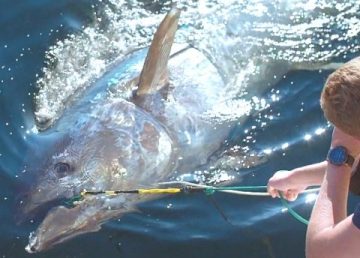 A new documentary on the Atlantic bluefin tuna says the giant fish are exhibiting unusual behaviour after they migrate into the Gulf of St. Lawrence, where some are being hand-fed by fishermen in the open ocean. “One of the things that has happened is they have lost their fear of human beings. They are just like pets. They are being fed over the side by fishermen,” said filmmaker John Hopkins of Square Deal Productions. The behaviour made filming the tuna much easier, he said, but it is puzzling. Hopkins’s National Film Board documentary, Bluefin, premieres at the Atlantic Film Festival on Wednesday. The 53-minute film chronicles the resurgence of bluefin tuna near the fishing port of North Lake, P.E.I., billed as the tuna capital of the world. Dalhousie University oceanographer Boris Worm likens the tuna returning to the Gulf of St. Lawrence to a last herd of buffalo roaming after the animal was wiped out everywhere else on the plains. Read the story here 11:26
A new documentary on the Atlantic bluefin tuna says the giant fish are exhibiting unusual behaviour after they migrate into the Gulf of St. Lawrence, where some are being hand-fed by fishermen in the open ocean. “One of the things that has happened is they have lost their fear of human beings. They are just like pets. They are being fed over the side by fishermen,” said filmmaker John Hopkins of Square Deal Productions. The behaviour made filming the tuna much easier, he said, but it is puzzling. Hopkins’s National Film Board documentary, Bluefin, premieres at the Atlantic Film Festival on Wednesday. The 53-minute film chronicles the resurgence of bluefin tuna near the fishing port of North Lake, P.E.I., billed as the tuna capital of the world. Dalhousie University oceanographer Boris Worm likens the tuna returning to the Gulf of St. Lawrence to a last herd of buffalo roaming after the animal was wiped out everywhere else on the plains. Read the story here 11:26
Brunswick shellfish harvesters work to remove ‘vicious clam predator’
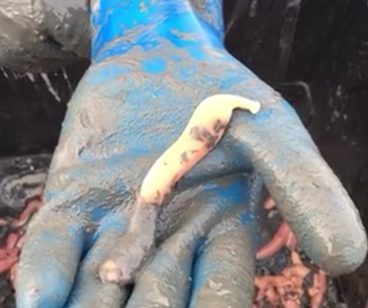 Brunswick Marine Resources says shellfish harvesters took to the Brunswick clam flats Sunday to remove a “vicious clam predator that’s been wreaking havoc” in Maine’s intertidal zone in recent years. The milky ribbon worm is believed to be causing moderate mortality to the soft shell clam population, according to the Brunswick Marine Resources. The worms are found primarily in the clam beds and are stumping resource managers on how to mitigate the problem. In the meantime, the Brunswick Marine Resources says harvesters are doing all they can to save some of their most productive flats. See the video here 09:48
Brunswick Marine Resources says shellfish harvesters took to the Brunswick clam flats Sunday to remove a “vicious clam predator that’s been wreaking havoc” in Maine’s intertidal zone in recent years. The milky ribbon worm is believed to be causing moderate mortality to the soft shell clam population, according to the Brunswick Marine Resources. The worms are found primarily in the clam beds and are stumping resource managers on how to mitigate the problem. In the meantime, the Brunswick Marine Resources says harvesters are doing all they can to save some of their most productive flats. See the video here 09:48
Hawaii longline industry creates task force to respond to allegations of human trafficking and poor working conditions.
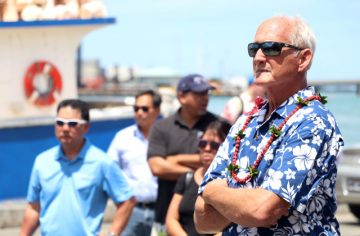 Hawaii longline industry leaders say they have formed a task force and hired an expert on slavery in response to media reports about human trafficking, forced labor and poor working conditions aboard some of their boats. “We’re trying to get a sort of fleet assessment, get our arms around the problem and see where we’re going to take it,” said Jim Cook, who owns several longline fishing boats and serves on the Hawaii Longline Association board of directors. He said Monday that the goal is to weed out the “bad actors,” in part by requiring a universal crew contract that incorporates international norms to address forced labor. That contract is being finalized and should be “ready to rock” in the next couple days, Cook said. The task force also includes John Kaneko, program manager of the Hawaii Seafood Council, Khang Dang, president of Quota Management, and Katrina Nakamura, who was also hired as a consultant to provide guidance to the industry. Read the story here 08:25
Hawaii longline industry leaders say they have formed a task force and hired an expert on slavery in response to media reports about human trafficking, forced labor and poor working conditions aboard some of their boats. “We’re trying to get a sort of fleet assessment, get our arms around the problem and see where we’re going to take it,” said Jim Cook, who owns several longline fishing boats and serves on the Hawaii Longline Association board of directors. He said Monday that the goal is to weed out the “bad actors,” in part by requiring a universal crew contract that incorporates international norms to address forced labor. That contract is being finalized and should be “ready to rock” in the next couple days, Cook said. The task force also includes John Kaneko, program manager of the Hawaii Seafood Council, Khang Dang, president of Quota Management, and Katrina Nakamura, who was also hired as a consultant to provide guidance to the industry. Read the story here 08:25
Fish Harvesters from around west coast attend meeting in Corner Brook to support FISH-NL
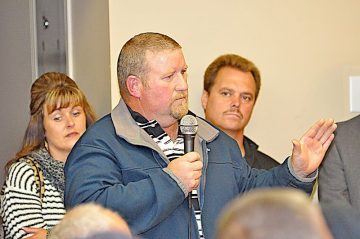 Bruce Short was not one of the ones who needed convincing. The Beaumont, Long Island fisherman drove three hours to the Royal Canadian Legion in Corner Brook on Monday to attend a meeting on the formation of a new union to represent fish harvesters in the province. “This is the most exciting day in my life, to see that the fishermen in this province are starting to get a backbone,” Short said just minutes after addressing the crowd of about 250 men and women with his support of the new FISH-NL, the Federation of Independent Sea Harvesters of Newfoundland and Labrador. He said it was time to get rid of the regime of the Fish, Food and Allied Workers (FFAW) union, a group he called “just a Mafia.” Read the story here 08:01
Bruce Short was not one of the ones who needed convincing. The Beaumont, Long Island fisherman drove three hours to the Royal Canadian Legion in Corner Brook on Monday to attend a meeting on the formation of a new union to represent fish harvesters in the province. “This is the most exciting day in my life, to see that the fishermen in this province are starting to get a backbone,” Short said just minutes after addressing the crowd of about 250 men and women with his support of the new FISH-NL, the Federation of Independent Sea Harvesters of Newfoundland and Labrador. He said it was time to get rid of the regime of the Fish, Food and Allied Workers (FFAW) union, a group he called “just a Mafia.” Read the story here 08:01
Great white shark named after Big Papi
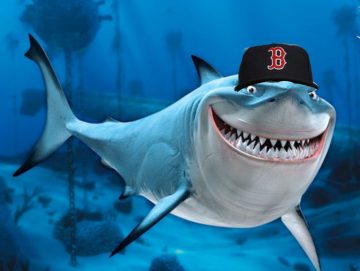 A great white shark spotted off the coast of Cape Cod has been named after retiring Boston Red Sox slugger David Ortiz. The Boston Globe reported that researchers from the nonprofit Atlantic White Shark Conservancy announced Saturday they were naming the 15-foot male shark “Big Papi” in honor of Ortiz, who is known by that nickname. The great white was tagged Sept. 9 off the coast of Wellfleet by state biologist Greg Skomal during an excursion with the conservancy. “Big Papi” is one of 19 sharks tagged off the Cape Cod coast since the start of the summer. 19:11
A great white shark spotted off the coast of Cape Cod has been named after retiring Boston Red Sox slugger David Ortiz. The Boston Globe reported that researchers from the nonprofit Atlantic White Shark Conservancy announced Saturday they were naming the 15-foot male shark “Big Papi” in honor of Ortiz, who is known by that nickname. The great white was tagged Sept. 9 off the coast of Wellfleet by state biologist Greg Skomal during an excursion with the conservancy. “Big Papi” is one of 19 sharks tagged off the Cape Cod coast since the start of the summer. 19:11
Cape Breton fishermen plead guilty to fishing closed area off Digby Neck
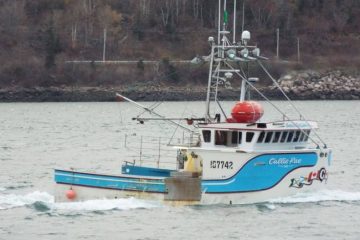 Kevin and Paul Cormier, father and son from New Waterford, were not in Digby Provincial Court Sept. 18, but their lawyer entered guilty pleas for them on charges of fishing in a closed area, fishing with untagged traps and fishing without the person named in the licence. The federal crown attorney Alex Pink told the court that Fishery Officers on a routine patrol off Digby Neck found a trawl of 20 traps set in Lobster Fishing Area (LFA) 34 on Nov. 15, 2015. The Fishery Officers seized those traps, which were about 900 metres inside LFA 34, which doesn’t open until the end of November. Fisheries officers then watched with binoculars as fishermen on the lobster boat Callie Ray dragged two more trawls, or 40 traps total, from LFA 34 over the line into LFA 35, which was open at the time. Read the story here 17:52
Kevin and Paul Cormier, father and son from New Waterford, were not in Digby Provincial Court Sept. 18, but their lawyer entered guilty pleas for them on charges of fishing in a closed area, fishing with untagged traps and fishing without the person named in the licence. The federal crown attorney Alex Pink told the court that Fishery Officers on a routine patrol off Digby Neck found a trawl of 20 traps set in Lobster Fishing Area (LFA) 34 on Nov. 15, 2015. The Fishery Officers seized those traps, which were about 900 metres inside LFA 34, which doesn’t open until the end of November. Fisheries officers then watched with binoculars as fishermen on the lobster boat Callie Ray dragged two more trawls, or 40 traps total, from LFA 34 over the line into LFA 35, which was open at the time. Read the story here 17:52

Upstart FISH-NL Turns Up the Heat on Fish, Food and Allied Workers Union!
Things got a little heated outside the Fish, Food and Allied Workers office in Corner Brook when some 250 harvesters from around the west coast marched there to show the union they are fed up with the representation they’ve been getting. The group had been attending a meeting on the formation of a new union at the Legion when Conway Caines of Cow Head, a regular on the Discovery Channel’s “Cold Water Cowboys,” suggested they hold a peaceful walk to the union’s office. Ryan Cleary, former MP and one of the men behind the formation of FISH-NL (the Federation of Independent Sea Harvesters of Newfoundland and Labrador), went with them. Cleary said FFAW president Keith Sullivan made a remark to the CBC that the group interested in forming the new union was a vocal minority. Read the story here 17:37
New England Fishery Management Council meeting in Danvers, MA September 20 – 22, 2016
 The New England Fishery Management Council will be meeting in Danvers, Ma. at the Double Tree by Hilton. To read the final agenda, click here Register here to listen live via webinar. click here They will send you an email notification. www.nefmc.org 15:47
The New England Fishery Management Council will be meeting in Danvers, Ma. at the Double Tree by Hilton. To read the final agenda, click here Register here to listen live via webinar. click here They will send you an email notification. www.nefmc.org 15:47
Effort to restore Stonington Town Wharf gets boost from senators
 An effort to restore the Town Wharf along the east side of Stonington harbor has gotten a boost from the state’s two U.S. senators. Richard Blumenthal and Chris Murphy announced last week that they had convinced the authors of the federal Water Resources Development Act to amend the act so the wharf could be returned to town control. “The Old Stonington Wharf is an historic treasure — a proud symbol of the town’s sea-faring and maritime heritage. The wharf has unacceptably been allowed to deteriorate under inadequate stewardship by the U.S. Army Corps of Engineers, and we applaud local efforts to reclaim and revitalize this celebrated marker. We were proud to help lead efforts today to return the wharf back to its rightful hands, and urge the House to adopt this measure,” Blumenthal and Murphy said in announcing the development. Read the rest here 12:10
An effort to restore the Town Wharf along the east side of Stonington harbor has gotten a boost from the state’s two U.S. senators. Richard Blumenthal and Chris Murphy announced last week that they had convinced the authors of the federal Water Resources Development Act to amend the act so the wharf could be returned to town control. “The Old Stonington Wharf is an historic treasure — a proud symbol of the town’s sea-faring and maritime heritage. The wharf has unacceptably been allowed to deteriorate under inadequate stewardship by the U.S. Army Corps of Engineers, and we applaud local efforts to reclaim and revitalize this celebrated marker. We were proud to help lead efforts today to return the wharf back to its rightful hands, and urge the House to adopt this measure,” Blumenthal and Murphy said in announcing the development. Read the rest here 12:10
NOAA research ecologist suggests, As climate change alters the oceans, what will happen to Dungeness crabs?
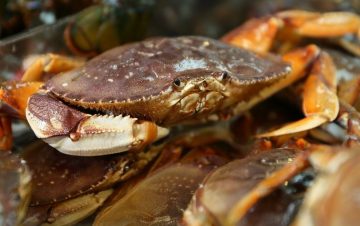 In my day job as a research ecologist with the National Oceanic and Atmospheric Administration’s Northwest Fisheries Science Center, I study how changes in seawater’s acidity from absorbing carbon dioxide in the air, referred to as ocean acidification may affect the success of recreational crabbers like me and the fortunes of the crabbing industry. Contrary to early assumptions that acidification was unlikely to have significant effects on Dungeness crabs, we found in a recent study that the larvae of this species have lower survival when they are reared in the acidified ocean conditions that we expect to see in the near future. Our findings have sobering implications for the long-term future of this US$170 million fishery. Ocean acidification is a global phenomenon,,, Read the rest here 11:03
In my day job as a research ecologist with the National Oceanic and Atmospheric Administration’s Northwest Fisheries Science Center, I study how changes in seawater’s acidity from absorbing carbon dioxide in the air, referred to as ocean acidification may affect the success of recreational crabbers like me and the fortunes of the crabbing industry. Contrary to early assumptions that acidification was unlikely to have significant effects on Dungeness crabs, we found in a recent study that the larvae of this species have lower survival when they are reared in the acidified ocean conditions that we expect to see in the near future. Our findings have sobering implications for the long-term future of this US$170 million fishery. Ocean acidification is a global phenomenon,,, Read the rest here 11:03
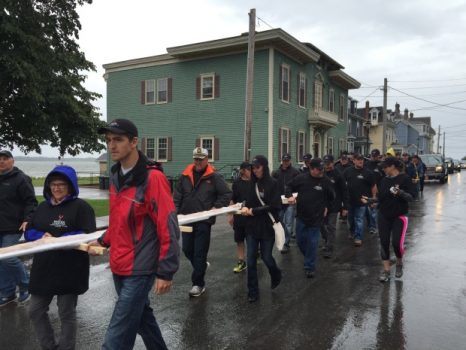
P.E.I sets the Lobster Roll World Record at 120 feet and 120 pounds of lobster meat!
It took 120 pounds of lobster meat, 13 kilograms of dough and about 180 volunteers, but P.E.I. is now the record holder of the world’s largest lobster roll. The exact length: 36.5 metres. That’s 120 feet long — longer than the length of a basketball court. Take that, New Brunswick. “They say it takes a village to raise a child. Well, I think it takes more than that to build a lobster roll,” said Melanie Giffin of the PEI Fishermen’s Association. “With the amount of work that went into it, there was no way we could let it fail.” The bun for the lobster roll was baked in a conveyor oven at the Culinary Institute of Canada from dough donated by the Water Street Bakery and Deli in Summerside. About 60 fishermen and their wives — accompanied by a police escort — paraded the massive roll 1.7 kilometres to the PEI International Shellfish Festival at the Charlottetown Event Grounds. Read the rest here 09:37

































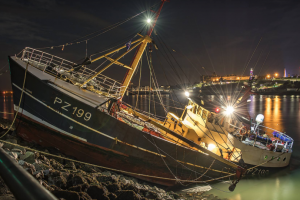

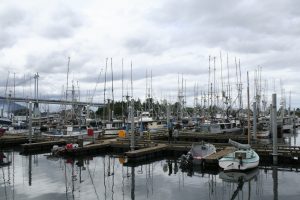

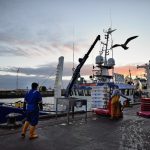
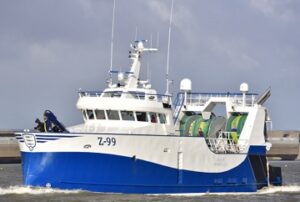

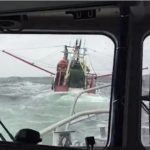

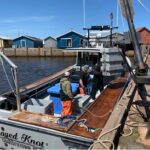
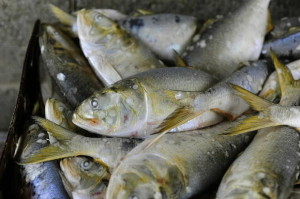
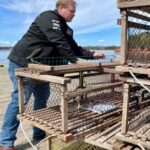




National Marine Fisheries Service Announces Industry-Funded Monitoring Amendment Public Hearings and Comment Period
Share this post